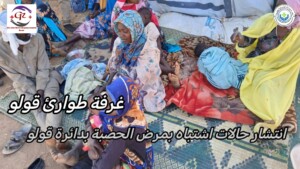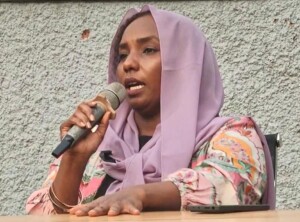Sudanese medics to offer free treatment in South Kordofan
On Thursday, a large medical convoy left the Sudanese capital, heading to the Nuba Mountains in South Kordofan where it will offer free treatment to the victims of war in the region.
People of all health professions, including members of the legal Doctors Syndicate, the Epidemic Prevention Institute, and resistance committees, participate in the Love and Peace Convoy.
 El Azrag in South Kordofan (Nuba Reports)
El Azrag in South Kordofan (Nuba Reports)
On Thursday, a large medical convoy left the Sudanese capital, heading to the Nuba Mountains in South Kordofan where it will offer free treatment to the victims of war in the region.
People of all health professions, including members of the legal Doctors Syndicate, the Epidemic Prevention Institute, and resistance committees, participate in the Love and Peace Convoy.
In addition to offering free treatment in mobile clinics, food and clothing will be distributed, Prof Siddig Tawir, member of the Sovereign Council, told reporters upon the dispatch from Khartoum. He called the convoy “an unprecedented gesture of brotherhood, love, and peace”.
Since civil war erupted again in the Nuba Mountains in June 2011, aid organisations were not allowed access to the region.
Radio Dabanga reported on August 1 that the Sudan People’s Liberation Movement-North faction in South Kordofan under the leadership of Abdelaziz El Hilu, declared an immediate unilateral cessation of hostilities, as a ‘goodwill gesture’.
The rebel faction decided to join the peace negotiations between the Sudanese government and the main rebel movements in the country in early September.
In mid-October, Sudan’s Sovereign Council authorised a UN World Food Programme (WFP) visit to the rebel-controlled area of Kauda in the Nuba Mountains.
November 30 that hundreds of people now feel safe enough to leave the rebel-controlled areas in South Kordofan, in search for basic services.
According to the Acting Humanitarian Aid Commissioner in South Kordofan, Zahra Faris, the improved security situation in South Kordofan and the re-opening of the border between Sudan and South Sudan has facilitated the movement of citizens.
The Sudan News Agency stated on November 28 that at least 2,200 people have returned to their areas of origin from rebel-held areas where they had sought refuge against government attacks, she said.
Radio Dabanga’s editorial independence means that we can continue to provide factual updates about political developments to Sudanese and international actors, educate people about how to avoid outbreaks of infectious diseases, and provide a window to the world for those in all corners of Sudan. Support Radio Dabanga for as little as €2.50, the equivalent of a cup of coffee.












 and then
and then